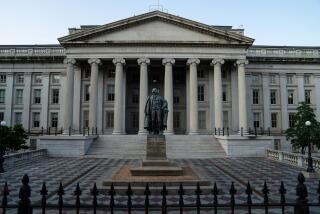Senate Democrats Predict Soaring Deficit Over 10 Years
WASHINGTON — Firing the latest salvo in a preelection battle over who should get the blame for U.S. budget woes, Senate Democrats on Thursday forecast a large federal deficit over the next 10 years, in contrast to a recent White House prediction of a similarly sized surplus.
In a Democratic staff analysis, the Senate Budget Committee estimated that the government will run a deficit of $475 billion from 2002 through 2011 if all of President Bush’s budget policies are enacted.
The White House Budget Office in July predicted a surplus of $444 billion over the same period.
The $919-billion difference between the 10-year forecasts, which budget analysts admit are imprecise at best, pales in comparison to the scale of the undisputed turnaround in the U.S. fiscal position over the last two years.
In early 2001, congressional and White House analysts were predicting 10-year surpluses of more than $5.6 trillion.
The “vanishing surplus” has become a major issue ahead of November’s elections--where small swings could shift party control of the House and the Senate.
Democrats generally blame Bush’s $1.35-trillion tax cut package last year, though few have so far been willing to call for it to be rolled back. Republicans counter that the tax cut is aiding the recovery from recession and the aftermath of Sept. 11, factors they point to in explaining current budget setbacks.
“Despite the notable impact of the recession and war on terrorism, there is simply no escaping the fact that the largest single factor causing the drop in surplus over the 10 years is the tax cut,” Senate Budget Committee Chairman Kent Conrad, a North Dakota Democrat, said in a statement.
If the offsetting effect of Social Security surpluses are excluded, the U.S. government will run a deficit of almost $2.8 trillion from 2002 to 2011, the Democratic report says.
It also projects a $158-billion deficit in fiscal year 2002, which ends on Sept. 30, close to the White House estimate of $165 billion. In 2003, however, Democrats predict the deficit will rise to $190 billion, versus a White House forecast that it will fall to $109 billion.
If Bush’s policies are adopted, the federal budget will not come back into balance until 2009, the report says. The administration predicts it can balance the budget by 2005.
The White House also has sought to recast the deficit debate into one about Congress’ spending habits, accusing the Democratic-led Senate of ignoring fiscal discipline by pushing for more money for nonemergency government programs.
Bush last week refused to spend $5.1 billion of lawmakers’ priorities that were part of a broader emergency counter-terrorism bill--including widely supported funds for aid to Israel, boosting airport security and fighting the global spread of AIDS.
“We cannot go down the path of soaring budget deficits. We must meet our defense and homeland security needs, and hold the line on other spending,” he said.
More to Read
Get the L.A. Times Politics newsletter
Deeply reported insights into legislation, politics and policy from Sacramento, Washington and beyond. In your inbox three times per week.
You may occasionally receive promotional content from the Los Angeles Times.










